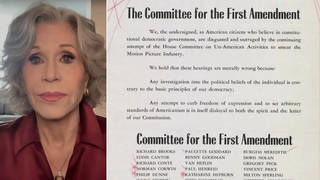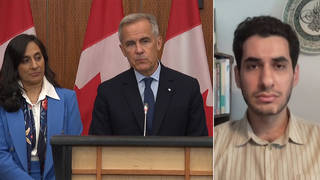
Topics
Guests
- Naomi Kleinauthor, journalist and senior correspondent for The Intercept. Her new book is titled The Battle for Paradise: Puerto Rico Takes on the Disaster Capitalists. She’s also author of No Is Not Enough: Resisting Trump’s Shock Politics and Winning the World We Need, This Changes Everything: Capitalism vs. the Climate and The Shock Doctrine: The Rise of Disaster Capitalism.
A crucial election in Canada tomorrow may bring a Trumpian leader to Canada’s most populous province. Conservatives and progressives are in a dead heat as Canadians prepare to go to the polls Thursday in Ontario to choose their next premier, the head of Ontario’s government. Voters will choose between Progressive Conservative candidate Doug Ford, whom many have compared to President Donald Trump, and New Democratic Party (NDP) candidate Andrea Horwath. We are joined by journalist Naomi Klein. She recently co-wrote a column in the Toronto Star titled “We can stop Trumpism from coming to Canada.”
Transcript
AMY GOODMAN: This is Democracy Now!, democracynow.org, The War and Peace Report, as we bring you Part 2 of our discussion with author and journalist Naomi Klein, senior correspondent for The Intercept. Her new book is out this week, The Battle for Paradise: Puerto Rico Takes On the Disaster Capitalists. Naomi is author of the books No Is Not Enough: Resisting Trump’s Shock Politics and Winning the World We Need, This Changes Everything: Capitalism vs. the Climate, The Shock Doctrine: The Rise of Disaster Capitalism and No Logo: Taking Aim at Brand Bullies.
But we, today, are going to move from Part 1 of our discussion on Puerto Rico to what’s happening in Canada.
Naomi, can you talk about the elections that are taking place on Thursday in Canada. You wrote a piece for the Toronto Star that’s called “We can stop Trumpism from coming to Canada.” Talk about it.
NAOMI KLEIN: Yeah, that piece, I co-wrote with Rinaldo Walcott, a wonderful Canadian academic. And in it, we make the argument that, yes, we can stop Trumpism from coming to Canada—a very real threat that we face right now, because in this election, that is happening tomorrow, for premier of Ontario, to be the new government in Canada’s most populous province, there is a new leader of the Conservative Party who is tied for first place in the polls, named Doug Ford. He is the brother of Toronto’s infamous Mayor Rob Ford, which the world knows about because of that crack video. And—
AMY GOODMAN: Explain, just very quickly.
NAOMI KLEIN: Well, so, the—when he was mayor, Doug [sic] Ford was very much a kind of a right-wing populist mayor, who did all kinds of very damaging—sorry, Rob Ford, did very damaging things for the city—cut back public services, super-funded the police. But that’s not what got the attention. What got the attention was the fact that he was sort of kind of a buffoon for the cameras, distracting attention—kind of Trumpian in that way. In fact, [inaudible] not enough, I drew that parallel as sort of making the argument that Rob Ford was kind of a forerunner for Trump for us in Canada, where you—where the sort of distraction of the outrageous behavior—and most outrageously, there was a video where he was filmed taking crack, and then he managed to survive that. So that’s what happens when a white politician is caught smoking crack. And he died last year.
His partner in crime, let’s just say, was his brother Doug Ford, who was on City Council, was his biggest defender. And now Doug Ford is running to be premier of Ontario and, as I said, is tied for first place with the Ontario NDP, our third party, our more left-wing party, because our centrist party, the Liberals, who have been in power now for two decades, their support has completely collapsed. So, you know, it’s something familiar that is happening around the world, where the center kind of collapses, the incumbent centrist party is seen as corrupt. They, you know, have botched privatizations, particularly of electricity. People’s rates have gone up. There’s a lot of anger at this centrist party, and they may actually come out of the election with one seat. So, it’s super volatile, and we may end up with Doug—with Doug Ford as premier, unless people—
AMY GOODMAN: Premier is like governor.
NAOMI KLEIN: Is like governor, right.
AMY GOODMAN: But he has even more power. He determines the whole government of the state of Ontario, the province?
NAOMI KLEIN: Yeah, he does. I mean, he would become premier if enough members of Parliament from—of Provincial Parliament from his party are elected to form government. So they—so we are facing the prospect of a Conservative majority in our Legislature in Ontario.
And what’s really, really worrying about this is that he’s running on this platform to cut taxes in various ways—to cut corporate taxes, to cut individual income taxes, to do away with Ontario’s cap-and-trade policies. So it’s a plan to blow a massive, multibillion-dollar hole in the budget. But he has refused to say how he will pay for it. And, in fact, he is running—and this is really unprecedented—he’s running without a platform. So all he does is go around making these outrageous promises, how he’s going to cut taxes, cut your gas prices, even things like a dollar a beer. He’s running on things like that. He’s really like a frat boy candidate. It’s sort of like student council president. You know, “I’m going to run and put Coca-Cola in the water fountains.” I mean, he is literally promising a dollar—a buck a beer. OK? But he won’t say how he’s going to pay for any of this. But the truth, we know, from former Conservative governments, is that it’s going to be paid for with massive cuts to education, to healthcare, to basic services. But he won’t admit to it, so people are just kind of enjoying the Rob Ford show.
There’s other Trumpian things he’s doing, like he won’t—he’s giving very limited press access, and he’s launched his own TV network. I think it’s called Ford Nation Live, where he’s interviewed by his executive assistant, and they pay to distribute these videos. So, it’s fake news. You know, it’s all of it.
But, you know, there is some good news here, and this is why I’m grateful to have a chance to talk about it with you, Amy. And the good news is that they can still be defeated, if we look at the polls, but it’s going to require a huge voter mobilization. It’s going to require people coming out as volunteers to marshal the vote for the Ontario NDP, who are running on a quite progressive platform—to extend universal healthcare in Canada to include dental care and pharmacare, to provide public child care, daycare services, for $12 a day. So, it’s a really progressive platform that the Ontario NDP is running on.
So we face this incredibly stark choice of whether or not we’re going to have our very own Donald Trump in Canada’s most populous province or whether potentially we could have a progressive government, which will certainly need to be held to account, to be pushed from the left, so that they keep those election promises. But, you know, I’m just really hoping that people get out and vote, and people volunteer. I voted before I came to New York to launch this book. And, you know, honestly, I can’t remember a more important election in my history of being a Canadian.
AMY GOODMAN: And what evidence of there—is there of mass mobilization right now? Are people very engaged or not?
NAOMI KLEIN: Well, I mean, what’s happened with the NDP is quite remarkable. They were really written off before this election. They weren’t treated seriously. It was seen that it was going to be an election between Doug Ford and the sitting Liberals. The NDP was in third place. And, you know, it was kind of like—the best parallel I can come up with is what was happening with Jeremy Corbyn before the last election, where he was really dismissed as, you know, not a player. People thought that the election was just going to wipe him out for good. And instead there was this huge surge. A lot of it had to do with young people’s turning out, bringing out the vote, going door to door. And what changed it for Corbyn was coming out with this very progressive platform that spoke to people’s urgent needs, right? So, its own kind of populism, but real economic populism, not this fake right-wing populism that is really about giving huge tax breaks to billionaires while claiming to be for the little guy. That’s Doug Ford. But the NDP really turned things around with this platform that, in very concrete ways, addresses some of the most urgent economic needs in Ontario, whether it’s the need for debt forgiveness for students or whether it’s the need for affordable child care or whether it’s the need for free dental care. So, you know, I don’t—
AMY GOODMAN: And the person representing NDP, Andrea Horwath?
NAOMI KLEIN: The leader is Andrea Horwath. And it’s significant, because in the last election in Ontario that they ran on with the same leader, she ran a very centrist campaign, sort of assuming that people don’t really want change, and she did very poorly. But now that she’s actually speaking to that desire for real change, which the right-wing populists are speaking to, she’s seeing her political fortunes turn around. I believe she can win this election, but not unless people come out in huge numbers, particularly young people, volunteering. It’s not just about voting, as we saw with Momentum in the U.K. So, I’m sorry I’m doing a bit of an election ad. I’ve been critical of the NDP in lots of contexts—
AMY GOODMAN: Well, I mean, it’s—
NAOMI KLEIN: —including in Alberta. I don’t plan on, you know, just rubber-stamping them. I think they’re going to need to be pushed. But it is so important that people come out.
AMY GOODMAN: I mean, the significance of a premier in a province in Canada we know from Tommy Douglas, right?
NAOMI KLEIN: Yeah.
AMY GOODMAN: Who became premier of Saskatchewan. And it was there that single payer, as we refer to it, national healthcare, was launched. And it was so successful in Saskatchewan, even with a strike led by the AMA—
NAOMI KLEIN: Yeah.
AMY GOODMAN: —the American Medical Association, which went north, afraid that if it was adopted in Saskatchewan, the contagion would spread not only across Canada but across the continent, to the United States. But he won. He brought single payer to Saskatchewan.
NAOMI KLEIN: Yeah.
AMY GOODMAN: And it became so wildly popular, it was then adopted throughout Canada.
NAOMI KLEIN: Right. And so, there’s the opportunity for Ontario to become a sanctuary city. Andrea Horwath, you know, you—on your show, you have covered the Black Lives Matter Toronto movement, and you’ve interviewed Desmond Cole, I think, a couple of times, talking about carding and racial profiling by the Toronto Police Department. One of the important things that Andrea Horwath has done is she has not only come out against carding, but she has committed to destroy all the records of the data collected from carding in the past, which has been a really important demand of BLM Toronto. So, you know, there is an opportunity to set some very important precedents in Ontario under an NDP government. They’re going to need to be pushed. Everybody knows that. I mean, that was the thrust of the piece that Rinaldo Walcott and I wrote.
But the stakes of this are huge, because, with Doug Ford, you know, he isn’t running on as explicitly a racist platform as Trump, but it’s very obvious, from coded messages that he has sent out, that once he is revealed as a complete fraud as an economic populist—you know, he is not standing up for the little guy, he’s standing up for the billionaires—then the scapegoating that, you know, is going to have to happen. You know, he boycotted a black leaders’ debate, for instance. He has—you know, he said—his gender politics are a little bit Trumpian. He’s constantly complimenting the women who he debates with on their smile and things like this. So, you know, we know what will happen if he comes into power and he’s revealed as, exposed as an economic fraud: He’s going to be looking for scapegoats. And it’s going to be people of color. It’s going to be blacks, indigenous people, the most vulnerable people, because that’s how these right-wing populists work. They follow a certain playbook. So, once again, we have this very stark choice, not like the Trump-Hillary choice, but actually two very different kinds of populism: the fake right-wing kind and one that is more within the left-wing tradition.
AMY GOODMAN: Naomi Klein, author, journalist, senior correspondent for The Intercept. Her latest book, released this week, The Battle for Paradise: Puerto Rico Takes On the Disaster Capitalists.
This is Democracy Now! I’m Amy Goodman. To see Part 1 of our discussion, the whole discussion of what’s taking place right now in Puerto Rico—hurricane season is upon us again—go to democracynow.org.












Media Options